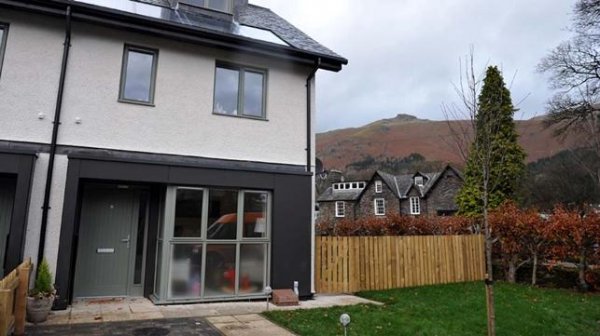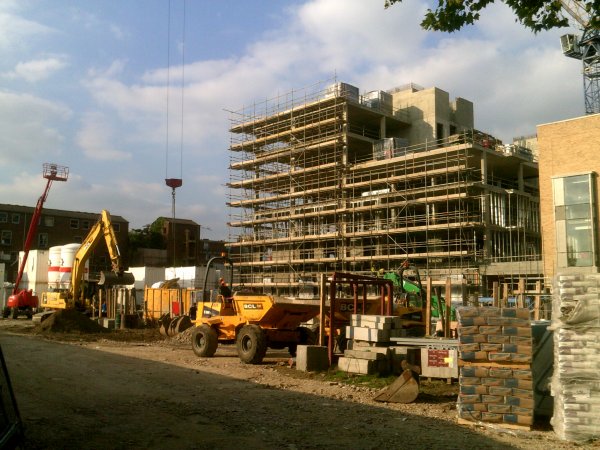Sep 25th 2020, 11:25
Blog 25th September 2020
In this blog I consider two important announcements made by the UK Government that affect the future of housing in England. Firstly, their white paper on planning – ‘Planning for the Future’; and secondly, the affordable homes programme for 2021 to 2026. I also outline our webinars.
‘Planning for the Future’ was issued in August 2020. It proposes relaxing planning laws and opens the way for unrestricted housing development in urban and rural areas without making any provision for affordable housing for local people.
It is generally accepted that there is a shortage of housing across England and that affordable housing is in particularly short supply. The government argues that the shortage of housing has been caused by councils’ reluctance to approve planning applications. However, with councils across the country approving nine out of ten planning applications and with councils having given approval for a million new homes that developers have yet to build, it is obvious that reforming planning laws in this way would not help people on waiting lists or struggling to afford a home. What is preventing affordable homes from being built it is the lack of funding for housing associations and a planning system that does not require developers to build enough affordable housing when they build a new scheme.

Affordable Homes built in Grasmere, Cumbria, by Impact Housing Association.
Under the government’s proposals, most of England would probably be designated a ‘growth zone’. Planning applications based on a government ‘design code’ would get automatic planning approval. New developments of up to fifty homes would no longer have to provide any affordable housing. In regeneration areas there would be an even greater relaxation of planning controls and strong planning controls would only be retained in the green belt. Section 106 agreements and the Community Infrastructure Levy that currently provide new affordable homes would be abolished and replaced with a new infrastructure levy that would be less effective. Local councils would be powerless to intervene in most cases. These proposals are seen by many as an attack on local democracy, will allow developers more opportunities to build what they want and will often deny people the chance to have their say on local development. They would be likely to result in increased numbers of second homes and hardly any affordable homes for local people.
The proposals contain very little detail on any alternative way to boost the number of affordable homes, promising only that they will not decrease.
The white paper proposes a consultation on developers making in-kind payments of affordable homes toward the levy or allowing local authorities to buy a proportion of affordable housing at a discounted rate.
The reaction of both the local government and housing sectors has been critical. The government is out to consultation. We have until 29th October 2020 to respond.
I have written a briefing paper on ‘Planning for the Future’. It summarises the white paper with an emphasis on its implications for housing, summarises the reaction to it from the sector and provides some commentary. To view or download a copy, please click here.
The Ministry for Housing, Communities & Local Government announced the Affordable Homes Programme for 2021 to 2026 on 8th September 2020. This was followed by Homes England issuing their prospectus on 10th September 2020. This programme will replace the current programme for 2016 to 2021 in April 2021 in England outside Greater London. In Greater London, a different programme is administered by the Greater London Authority.
Affordable housing, as defined by the National Planning Policy Framework, is housing for sale or rent for those whose needs are not met by the market. The provision of affordable housing has been a key element of successive Government’s plans to end the housing crisis, tackle homelessness and provide aspiring homeowners with a step onto the housing ladder. However, during recent years the emphasis has shifted from supporting homes for social rent, to supporting homes for ‘affordable rent’ to supporting people into home ownership.
The Affordable Homes Programme provides grant funding to support the capital costs of developing affordable housing for rent or sale. The £12.2 billion overall investment in affordable housing was confirmed at Budget, which also includes £700million on new homes through the 2016 to 2022 programme. A new £11.5billion Affordable Homes Programme will be delivered over five years from 2021 to 2026, providing up to 180,000 new homes across the country, should economic conditions allow. New homes will be made available from next year. The government calculates that the programme will unlock a further £38billion in public and private investment in affordable housing. The use of the phrase ‘should economic conditions allow’ appears to acknowledge that the 180,000 new homes may not be delivered because of the combination of coronavirus and Brexit.

Affordable Homes being built in Kensington by Catalyst Housing Association
As the Government’s housing accelerator for England outside London, Homes England will make available £7.4billion from April 2021 to deliver up to 130,000 affordable homes by March 2026. This is over £2billion more than the amount given under the previous Affordable Homes Programme. The Greater London Authority has been offered £4billion. This represents a significant reduction in the budget for London and a significant increase in the budget outside London that the government states reflect its ‘levelling up’ agenda.
The Affordable Homes Programme for 2021 to 2026 represents an increase when compared with the 2016 to 2021 programme but is still far less than was provided for affordable housing before 2011. The programme reduces provision in London and increases it in other parts of England and increases provision for home ownership while reducing provision for social and affordable housing. Support for social housing will effectively be confined to areas of high housing pressure in the south-eastern and eastern regions; while it is likely that the same regions will benefit most from the home ownership programme.
The ‘right to shared ownership’ has the potential to undermine the ability of housing associations to sustain enough social homes to meet need.
The government calculates that there are 3.5million people on social housing waiting lists but the National Housing Federation calculates that there are four million in need. They calculate that there is a need to build 90,000 social homes a year to meet need but during recent years only about half these numbers have been built. This Affordable Housing Programme is likely to see a further reduction in the number of social homes built. It is widely seen in the sector as a missed opportunity to tackle the housing crisis that England faces.
I have written a briefing paper on the affordable homes programme, that summarises the government’s announcements and the prospectus issued by Homes England, outlines the reaction of the sector, and provides some commentary. To view or download a copy, please click here.
We will be holding webinars from September 2020 to January 2021 including:
For further information or to make a booking, please click here.